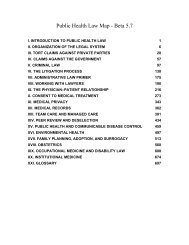Healing a Broken World - Society of Jesus
Healing a Broken World - Society of Jesus
Healing a Broken World - Society of Jesus
Create successful ePaper yourself
Turn your PDF publications into a flip-book with our unique Google optimized e-Paper software.
<strong>Healing</strong> a <strong>Broken</strong> <strong>World</strong><br />
the prominent ones and those relatively less visible, have essentially turned<br />
on questions concerning the misery <strong>of</strong> marginalized communities brought<br />
about by the alienation <strong>of</strong> their livelihood resources. 28 There is a lack <strong>of</strong><br />
political will to address this ecological crisis holistically. 29 In recent years, the<br />
government, rather than working for land reforms and equitable<br />
distribution <strong>of</strong> resources, has been providing free land and resources to<br />
foreign companies. As a result <strong>of</strong> neo-liberal policies, the socio-economic<br />
situation has worsened <strong>of</strong> late, especially for the poor, the tribals and the<br />
Dalits. 30 The growth <strong>of</strong> the Chipko movement provides valuable lessons in<br />
grassroots advocacy 31. Apart from the complete ban on felling <strong>of</strong> the trees in<br />
the Himalayas today, the demand <strong>of</strong> the local populace is for greater local<br />
control <strong>of</strong> the forest for local use.<br />
North America<br />
21] Reliance on fossil fuels is a fundamental environmental issue in North<br />
America (N.A.). Historically, the United States has been the world‘s largest<br />
emitter <strong>of</strong> greenhouse gases (exceeded only by China in this decade),<br />
whereas Canada ranks 7th. International action on climate change requires<br />
cooperation from the U.S. to be effective. Recent technologies developed for<br />
extraction <strong>of</strong> hitherto unattainable fossil fuels produce immense damage to<br />
large landscapes (e.g. tar sands extraction in Alberta, mountain-top removal<br />
coal mining in the Appalachians, oil shale extraction in Canada and U.S.,<br />
and deep sea oil drilling). Other environmental challenges in North America<br />
are consequences <strong>of</strong> industrialized agriculture technologies. While food<br />
production is higher than at any time in history, industrialized agriculture<br />
has wide-spread external environmental costs, including extensive<br />
deforestation, loss <strong>of</strong> soil, depleted aquifers, accumulation <strong>of</strong> herbicides and<br />
pesticides, polluted rivers, coastal marine dead zones, and the release <strong>of</strong><br />
relatively untested Genetically Modified Organisms (GMOs) into the<br />
environment. A third issue, overconsumption, is a driver for natural<br />
resource depletion, an economy <strong>of</strong> disposable goods, and waste<br />
accumulation. An emerging environmental movement is responding with<br />
awareness campaigns, clean energy research, entrepreneurial ―green‖<br />
businesses, small-scale organic farming, used-products outlets, and more<br />
responsible consumerism.<br />
Page 23 ■
















